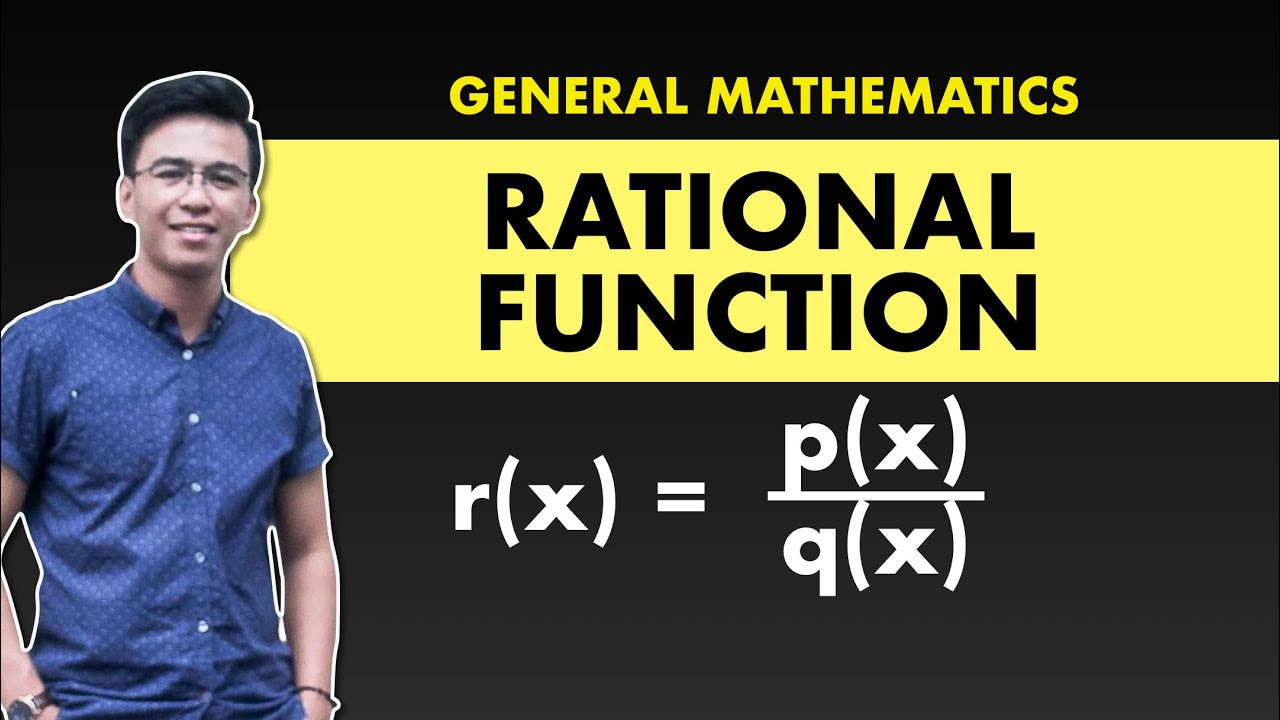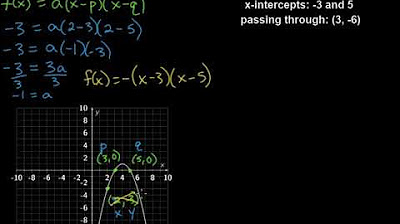Introduction to Rational Function I Señor Pablo TV
Summary
TLDRThis lesson introduces the concept of a rational function, which is a ratio of two polynomials, denoted as f(x) = p(x) / q(x), where p(x) and q(x) are polynomials and q(x) must not be zero. The video clarifies that a rational function becomes undefined when the denominator equals zero. Examples are given to distinguish between rational functions and polynomials, emphasizing the importance of the denominator in defining a rational function. The lesson concludes with a reminder to subscribe to the channel for more educational content.
Takeaways
- 📚 A rational function is represented as f(x) = p(x) / q(x), where p(x) and q(x) are polynomials.
- ⚠️ The denominator q(x) must not be equal to zero for the function to be considered rational.
- 🚫 The presence of a non-polynomial term in the denominator, such as x^(1/2), makes the function not a rational function.
- 🔍 The condition q(x) = 0 is problematic as it makes the rational function undefined.
- 📉 An example of an undefined rational function is x + 1 over 0, as the denominator is zero.
- 📈 The script provides an example of a rational expression: x^2 + 3x + 2 over 0, which is undefined due to the zero denominator.
- 🔢 The script contrasts rational functions with polynomial functions, indicating the importance of the denominator being a polynomial.
- 🤔 The script asks if x^2 + 4 over x + 3 is a rational function, implying it is conditional based on the value of x.
- 💯 The script confirms that x + 1 over x + 3 is a rational function, as the denominator is a polynomial and not zero.
- 📚 The importance of understanding the definition and conditions of rational functions is emphasized for mathematical comprehension.
- 👋 The script concludes with a reminder to subscribe to the channel for more educational content.
Q & A
What is a rational function?
-A rational function is a mathematical expression denoted by f(x) = p(x) / q(x), where p(x) and q(x) are polynomials, and q(x) must not be equal to zero.
What is the condition for a function to be considered a rational function?
-A function is a rational function if it can be expressed as the ratio of two polynomials, with the denominator not equal to zero.
What happens if the denominator of a rational function is zero?
-If the denominator of a rational function is zero, the function is undefined at that point.
Can a rational function have a non-polynomial expression in the numerator or denominator?
-No, both the numerator and the denominator of a rational function must be polynomials.
Is the expression x + 1 over zero a rational function?
-No, the expression x + 1 over zero is not a rational function because the denominator is zero, which makes the function undefined.
What is the condition for the expression x squared plus 3x plus 2 over 0 to be considered a rational expression?
-The expression x squared plus 3x plus 2 over 0 is not a rational expression because the denominator is zero, which violates the condition for a rational function.
Is the expression x raised to one half plus three over x squared a rational function?
-No, the expression x raised to one half plus three over x squared is not a rational function because the numerator contains a non-polynomial term (x to the power of 1/2).
Is the function x squared plus four over x plus three a rational function?
-Yes, the function x squared plus four over x plus three is a rational function because it is the ratio of two polynomials and the denominator is not zero.
Is the expression x plus one over x plus three a rational function?
-Yes, the expression x plus one over x plus three is a rational function, as both the numerator and the denominator are polynomials and the denominator is not zero.
What should you do if you encounter a rational function with a zero denominator?
-If a rational function has a zero denominator, you should recognize that the function is undefined at that specific value of x.
How can you determine if a given expression is a polynomial function?
-An expression is a polynomial function if it is a sum of terms with non-negative integer exponents of the variable, without any division by a variable.
What does the script suggest to do after learning about rational functions?
-The script suggests subscribing to the channel for more lessons and information.
Outlines

This section is available to paid users only. Please upgrade to access this part.
Upgrade NowMindmap

This section is available to paid users only. Please upgrade to access this part.
Upgrade NowKeywords

This section is available to paid users only. Please upgrade to access this part.
Upgrade NowHighlights

This section is available to paid users only. Please upgrade to access this part.
Upgrade NowTranscripts

This section is available to paid users only. Please upgrade to access this part.
Upgrade Now5.0 / 5 (0 votes)





